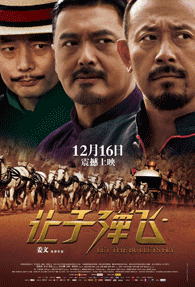
Set during China’s Warlord era, Let the Bullets Fly begins with an exciting train heist by a group of masked riders led by “Pockmarked” Zhang (Jiang Wen) that results in the death of a newly-minted provincial governor and his military escort, leaving only his shifty Counselor (Ge You) and his wife (Carina Lau) as survivors. Impersonating the Governor, “Pockmarked” Zhang and his gang team up with said Counselor to line their pockets in Goose City - which has been been already milked dry by local robber baron and despot Huang (Chow Yun Fat). This begins a series of manoeuvres and counter-manoeuvres between “Pockmarked” Zhang and Huang – while Counselor also awaits his share of the loot.
In every way a match for Leone, Corbucci and Peckinpah, Let the Bullets Fly is notable for its rollicking, irreverent tone rarely seen in Chinese film, and knowingly winks at the audiences as to its influences. A train pulled by horses, a nonsensical syncretic funeral rite, and gun battles where the combatants coordinate using an indecipherable series of bird whistles all help to create an absurdly funny world no less vivid than the Monument Valley locations of John Ford or the parched, desolate locales of the Spaghetti Westerns.
The humour though is uniquely Chinese; quick and witty, mixing elegant turns of phrase with crude expressions and a sort of double talk in which everyone seeks to stay ahead of the other by a few paces. The dialogue coupled with absurd, complicated set pieces seem to recall oddly enough the work of PG Wodehouse. All of this done is without ever distracting from its oddly poignant underlying message about revolutions: that it’s not about the money, it’s not about the power, it’s about the lack of power. Until the last thing is addressed, it’ll just be a case of “new boss, same as the old” when all is done.
Chinese cinema proves with Let the Bullets Fly that it can safely add Spaghetti Westerns to the number of genres it has mastered. Sorry, that should be “Lo Mein” Western there... As this reviewer has said while reviewing Rango, this year marks the relative comeback of Westerns after the genre’s near-dormancy for about 30 years since the flop that was Heaven’s Gate.

